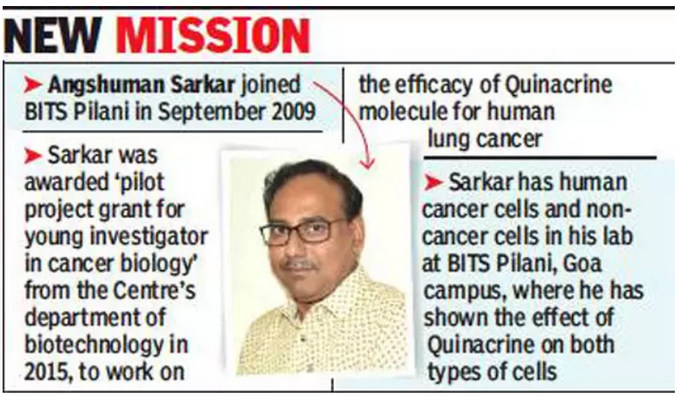By Gauree Malkarnekar | 11 January 2020
The Times of India

PANAJI: Four years after receiving a grant from the Centre’s department of biotechnology to work on repurposing an anti-malarial drug for the possible treatment of lung cancer, Angshuman Sarkar, an assistant professor at BITS Pilani KK Birla Goa campus, has successfully demonstrated how it kills lung cancer cells in humans.
Non-small cell lung cancer (NSCLC), which accounts for 80% of all lung cancer cases diagnosed, is notoriously tough to treat because of its resistance to drugs. Once the drug based on Sarkar’s research is made available in the market, it is set to achieve two remarkable objectives—make treatment significantly more affordable and increase the lifespan of patients.
The repurposed drug is based on Quinacrine (QC), a well-known anti-malarial medication.
“Two of the major challenges for the treatment of lung cancer are chemo resistance and metastasis (spreading of cancer in other parts of body). NSCLC amongst all other types are much more prone to acquire resistance despite the variety and combination of drugs being used,” said Sarkar, who works at the institute’s department of biological sciences, and received his post-doctoral training at the Cleveland Clinic’s cancer biology department.
“Almost all patients who receive treatment acquire resistance after cycles of treatment given to them,” said Sarkar, whose research has also been accepted for publication in ‘Oncotarget’, one of the world’s top oncology journals.
NSCLC is sub-categorised into carcinoma, adenocarcinoma and squamous cell carcinoma. Adenocarcinoma and squamous cell carcinoma account for most lung cancer cases diagnosed in India.
Sarkar said scientists have begun to repurpose old and clinical drugs used for other treatment towards cancer cure due to the extremely high cost of even a single cycle of innovative therapies.
“Worldwide, a lot of emphasis has been placed on discovering bioactive compounds which have potential effects on cancer progression, metastatic spread as well as overcoming the chemo resistant adaptation by cancer cells,” Sarkar told TOI.
“Quinacrine is one such synthetic bioactive compound, popularly known as anti-malarial drug. There have been few reports of uncovering the anti-cancerous potential of this molecule (QC) on different types of cancer.”
A detailed scientific work was carried out by Sarkar and his co-workers at his department at BITS Pilani, Goa Campus, in collaboration with IBAB, Bengaluru. Through their work, QC’s effects on human lung cancer cells have been established for the first time.
“At present, soon after a patient is detected with NSCLC, within a year or two, the person dies, and chemotherapy does not work. We believe that our finding will help the scientific community formulate better drug conjugates and combinations with this molecule, which may curb the progression and lethality of this demonic disease affecting millions of lives every year,” said Sarkar.
“As biomedical researchers and a part of scientific community, it is our first and foremost responsibility to find medications that can effectively cure diseases and can be affordable for every human being to utilize its benefits,” he said.

Recent Comments